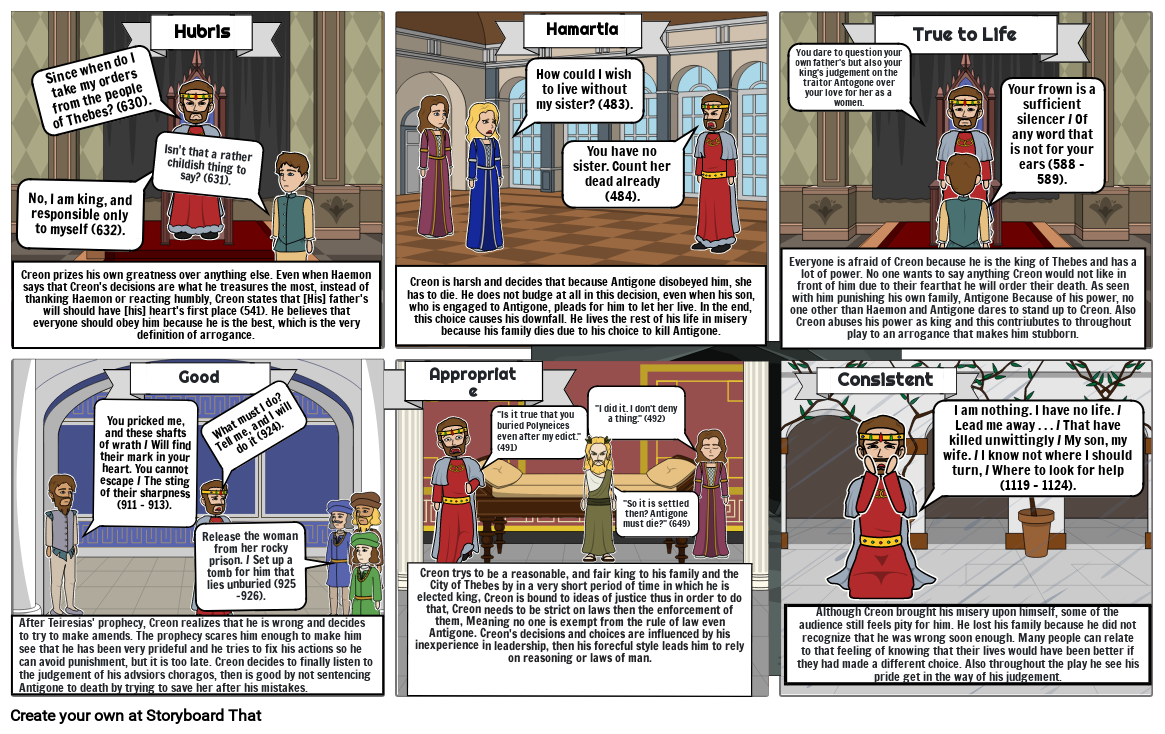Antigone Qualities of a Tragic Character

Storyboard Text
- Creon prizes his own greatness over anything else. Even when Haemon says that Creon's decisions are what he treasures the most, instead of thanking Haemon or reacting humbly, Creon states that [His] father's will should have [his] heart's first place (541). He believes that everyone should obey him because he is the best, which is the very definition of arrogance.
- No, I am king, and responsible only to myself (632).
- Since when do I take my orders from the people of Thebes? (630).
- Hubris
- Isn't that a rather childish thing to say? (631).
- Creon is harsh and decides that because Antigone disobeyed him, she has to die. He does not budge at all in this decision, even when his son, who is engaged to Antigone, pleads for him to let her live. In the end, this choice causes his downfall. He lives the rest of his life in misery because his family dies due to his choice to kill Antigone.
- Hamartia
- How could I wish to live without my sister? (483).
- You have no sister. Count her dead already (484).
- Everyone is afraid of Creon because he is the king of Thebes and has a lot of power. No one wants to say anything Creon would not like in front of him due to their fearthat he will order their death. As seen with him punishing his own family, Antigone Because of his power, no one other than Haemon and Antigone dares to stand up to Creon. Also Creon abuses his power as king and this contriubutes to throughout play to an arrogance that makes him stubborn.
- You dare to question your own father's but also your king's judgement on the traitor Antogone over your love for her as a women.
- True to Life
- Your frown is a sufficient silencer / Of any word that is not for your ears (588 - 589).
- After Teiresias' prophecy, Creon realizes that he is wrong and decides to try to make amends. The prophecy scares him enough to make him see that he has been very prideful and he tries to fix his actions so he can avoid punishment, but it is too late. Creon decides to finally listen to the judgement of his advsiors choragos, then is good by not sentencing Antigone to death by trying to save her after his mistakes.
- You pricked me, and these shafts of wrath / Will find their mark in your heart. You cannot escape / The sting of their sharpness (911 - 913).
- Good
- What must I do? Tell me, and I will do it (924).
- Release the woman from her rocky prison. / Set up a tomb for him that lies unburied (925 -926).
- Appropriate
- Creon trys to be a reasonable, and fair king to his family and the City of Thebes by in a very short period of time in which he is elected king, Creon is bound to ideas of justice thus in order to do that, Creon needs to be strict on laws then the enforcement of them, Meaning no one is exempt from the rule of law even Antigone. Creon's decisions and choices are influenced by his inexperience in leadership, then his forecful style leads him to rely on reasoning or laws of man.
- Is it true that you buried Polyneices even after my edict. (491)
- I did it. I don't deny a thing. (492)
- So it is settled then? Antigone must die? (649)
- Although Creon brought his misery upon himself, some of the audience still feels pity for him. He lost his family because he did not recognize that he was wrong soon enough. Many people can relate to that feeling of knowing that their lives would have been better if they had made a different choice. Also throughout the play he see his pride get in the way of his judgement.
- Consistent
- I am nothing. I have no life. / Lead me away . . . / That have killed unwittingly / My son, my wife. / I know not where I should turn, / Where to look for help (1119 - 1124).
Over 30 Million Storyboards Created
No Downloads, No Credit Card, and No Login Needed to Try!
